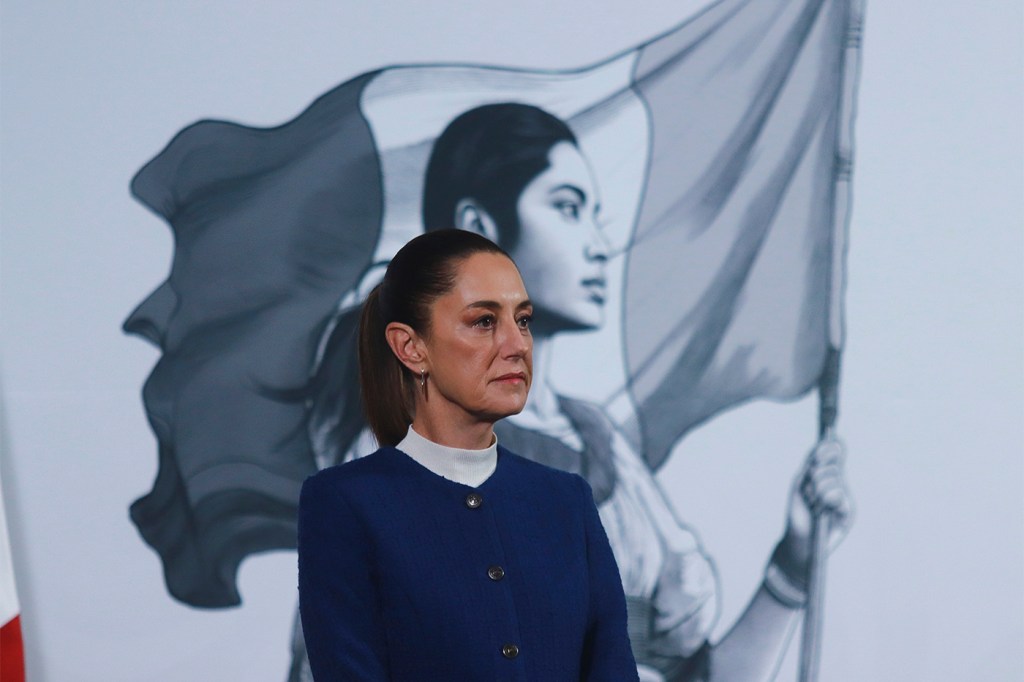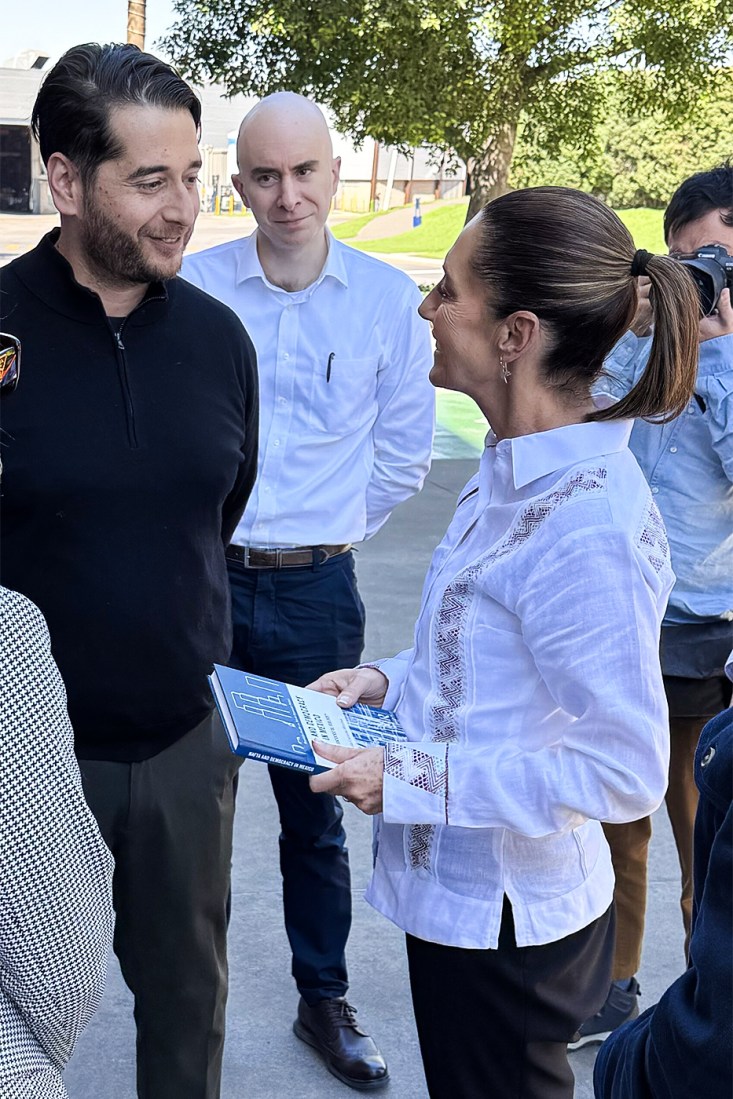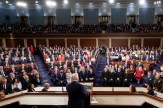After 100 days in office, Mexican President Claudia Sheinbaum braces for her biggest challenge yet — Trump 2.0
Pablo Calderon Martinez, an associate professor in politics and international relations, says Trump’s threat of 25% tariffs are a major economic concern for Mexico.

LONDON — Landslide victories do not automatically make for easy governing — just ask British Prime Minister Keir Starmer, whose party’s popularity has plummeted in only six months since coming to power.
But other world leaders are making it look simple. Mexican President Claudia Sheinbaum defeated her rival in a summer contest by more than 30 points. One hundred days after being installed in October, she continues to ride high in the polls — a recent survey showed she holds a 70% approval rating.
The next four years may not be as smooth though for Mexico’s first female leader. A rather large challenge is fast approaching in the form of the second presidential term of Donald Trump, who was inaugurated on Jan. 20.
Pablo Calderon Martinez, an associate professor in politics and international relations at Northeastern University, says the tariffs proposed by the Republican president-elect could wreck the budget for Sheinbaum’s domestic platform of delivering infrastructure improvements and social programs.
Trump has threatened to impose 25% tariffs on all goods coming into the U.S. from Mexico unless the country cracks down on unlawful migration and drug smuggling across the border. The U.S. is by far Mexico’s largest trading partner, which means that such punitive measures could be damaging to its economy.
Calderon Martinez says the “Achilles heel” for Sheinbaum’s six-year term surrounds “whatever Trump decides to do.”
“There is a real fear that Trump may very well sign an executive order on the first day and say 25% tariffs on all Mexican products, which essentially eliminates the Free Trade Agreement of North America (NAFTA) between the U.S., Canada and Mexico,” he says.
“It pretty much eradicates the World Trade Organization because then China can say, ‘Well, the U.S. is doing it, so I can do it and anybody else can do it too.’ To a great extent, it would signify the end of free trade as we know it.”

Calderon Martinez, who teaches at Northeastern’s London campus, argues that Trump’s trade war threat to Mexico, Canada and China would be “completely counterintuitive.” It would, he says, be “passing the cost on to American consumers” who would pay a higher price for imported goods.
But with Trump’s style of leadership rooted in unpredictability, Calderon Martinez says there is no way to rule tariffs out. And if they do happen, it would be bad news for Mexico.
“Tariffs would be really problematic for Mexico economically,” Calderon Martinez continues. “It would put in jeopardy all the social programs and all the basic infrastructure projects, so I wouldn’t be surprised if the Mexican government is working hard behind the scenes, making sure that they can ameliorate that. I’m sure they are lobbying, in the same way as many other governments will be doing, to try to make it not happen.”
He speculates that Mexico City could look to use immigration as a “bargaining tool” with the White House, with the threat of reducing border controls if Trump goes ahead with his import taxes tactic.
Calderon Martinez’s analysis comes after his own economic conversation with Sheinbaum on a recent trip to his homeland.
During a private visit by the Mexican president to his home state of Jalisco, Calderon Martinez and Sheinbaum spoke about his book, “NAFTA and Democracy in Mexico: A Successful Failure?” with the lecturer handing her a copy.
He explained to her how his research, published in 2018, argued that NAFTA was a “missed opportunity that could have led to more positive changes in the political landscape” but that economic considerations and misunderstandings impeded relations.
“She said she broadly agreed,” Calderon Martinez says. “She was like, ‘Yes, I agree. I think NAFTA neoliberalism had some drawbacks and it came with a lot of baggage.’
“That is fair enough — she is from a left-wing party so that is a viewpoint she would have aired many times.”
The Dec. 28 encounter with Sheinbaum — who herself was an academic before entering politics — left an impression on Calderon Martinez, who said it was not difficult to see why the leader had remained a popular figure since her election, despite her Morena party having been in power for more than six years. Her predecessor, Andres Manuel Lopez Obrador, formerly led the party, with the pair both being elected on a pledge to root out corruption.
Editor’s Picks
“I found the Mexican president really warm and engaging,” he continues. “I think that explains to a great extent her popularity. People still crave that — that genuine feeling from politicians.
“My lasting impression is that that is her biggest asset. She is not as charismatic as her predecessor — Lopez Obrador was larger than life. But she seemed genuinely to be a nice person. There were no cameras around, it wasn’t a public event so she didn’t have anything to gain from being overly nice. But everybody she met, she would stop and have a little bit of a conversation. That was the thing that surprised me.”
Sheinbaum showed some of her dry humor recently when hitting back at Trump over his glib comments about wanting to rename the Gulf of Mexico the Gulf of America because the name has a “beautiful ring to it.”
Sheinbaum’s riposte was to call for North America to be renamed “Mexican America” because a founding document dating from 1814 that preceded Mexico’s constitution referred to it that way.
“That sounds nice, no?” she joked.
While Trump’s economic policy is a threat to Mexico and Sheinbaum’s vision for her country, Calderon Martinez argues that his second term could also unite the country behind her administration.
“Arguably the Trump issue always helps the sitting president,” he posits. “Why? Because he makes for a common enemy. Whenever Trump does something crazy — like his Gulf of America comments — it is an easy political win for the Mexican president to say, ‘The Gulf of Mexico is the name recognized by the United Nations; Mexico is a sovereign nation and we won’t accept that.’
“So it is an easy way for her to look presidential — to issue a call for unity and to rise above.”











